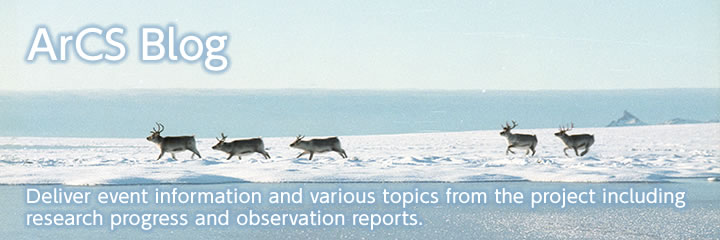From 2 July to 10 August, I was on board the USCGCS ice breaker Healy for oceanographic observations in the Chukchi Sea, Arctic Ocean.

Arctic Science Summit Week 2016 (ASSW2016) was held from March 12th to 18th, 2016 in Fairbanks, USA. There were around 50 Japanese participants including those who from National Institute of Polar Research, Japan Agency for Marine-Earth Science and Technology and Hokkaido University, the core institutes of the ArCS. During the week, the ASSW Business Meetings, the Arctic Observing Summit 2016 (AOS2016), the Model Arctic Council, and the Senior Arctic Officials Meeting were held, in which more than 1000 people participated in total.
We exhibited the ArCS project during Japan Geoscience Union (JpGU) 2016 Meeting held from 22nd to 25th May, 2016 at Makuhari Messe. ArCS brochure, which was issued just in time for this exhibition, and the brochures of core institutes were distributed at the booth, and posters introducing research themes and other activities were presented. Demonstrations of the Arctic Data archive System (ADS) were also set up to greet visitors.
The Expert Group on Black Carbon and Methane (EGBCM) held its second meeting in Helsinki, Finland on June 8-9, 2016. Karen Florini (United States) chaired the meeting. Participants included seven Arctic States (Canada, Finland, Iceland, Kingdom of Denmark, Norway, Sweden and the United States); one Permanent Participant organization (the Arctic Athabaskan Council); four Observer States (Germany, Italy, Japan, and Poland); the European Union; and two Arctic Council working groups (AMAP and ACAP).
We have released the summer Arctic sea-ice forecast.
In order to quantify the changes of glaciers and the ice sheet, and to study their interaction with the ocean, we are conducting in situ field observations in northwestern Greenland.
The first 3-day meeting on “Resilience and adaptive capacity of Arctic marine systems under a changing climate (RACArctic)” was organized by the Arctic Research Center of Hokkaido University (ARC-HU) and was held at Hakodate research center for fisheries and oceans, from March 1-3, 2016.
GEO 2016 Work Programme Symposium was held from 2 to 4 May 2016 in Geneva, Switzerland. Group on Earth Observation (GEO) is an international framework which was established in 2005 based on intergovernmental consensus of the Earth Observation Summit I-III and consists of more than 100 nations, 90 international organizations and European Commission. Since voluntary activities by the member nations and organizations are the substance of the GEO, the symposium brings together GEO members, their observation/data-related institutions and GEO Secretariat to discuss on various themes ranging from implementation of the tasks of the work programme to the governance of GEO.
The first Joint seminar was held at Faculty of Fisheries Sciences, Hokkaido University, on 1 April 2016.
On April 11, 2016, the “People and Community in the Arctic” project, which is one of the sub-projects of the Arctic Challenge for Sustainability (ArCS) co-hosted a joint workshop on “Challenges for a Sustainable Arctic” with the University of Victoria, Canada. The objectives of the workshop were: (1) to foster the exchange of expertise on Arctic issues; and (2) to lay the groundwork for Japan to positively contribute to the challenges provided by the Arctic in both the social sciences and natural sciences.




